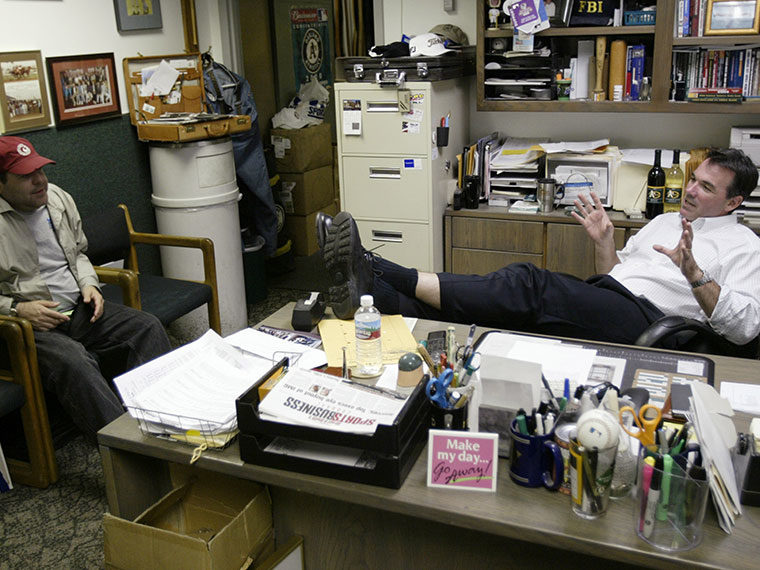Director expertise disciplines CEO into providing better information
Decades of acquisitions across multiple and unrelated industries made General Electric Co. the world’s largest conglomerate, and then it all came apart. Over the last three years, the company has unloaded what were once seemingly attractive business units and in November said it was splitting the surviving operations into three separate companies. Hundreds of billions of dollars in market value have been destroyed.

During its long rise, through the tenure of CEO Jack Welch and then well into the reign of his unfortunate successor, Jeff Immelt, GE’s board signed off on many deals that ultimately wiped out shareholder value. A working paper suggests the company might have been better off with directors who were more hostile to management’s acquisition spree.
The paper, from Charles University’s Martin Gregor and UCLA Anderson’s Beatrice Michaeli, employs a theoretical model to suggest that, when faced with an “empire-building” CEO, an unfriendly board would be less likely to approve projects that damage the value of the company. Such boards would be less willing to rubber-stamp deals suggested by the CEO and more likely to demand the executive provide more complete data about an investment’s value.
How Board Alignment Affects Investment Efficiency
As a result, the company might make fewer bad investments and more profitable ones. This theoretical prediction is consistent with empirical findings that when shareholder activism leads to hostile boards, companies make fewer investments and are more profitable.
“Reducing the alignment of interests between CEOs and boards can improve investment efficiency,” the authors write.
The authors’ model considers a board that can be biased. Broadly speaking, based on its bias, the board can be classified into one of three categories:
- Biased toward approving the CEO’s projects because directors are company insiders or are otherwise loyal to the chief executive.
- Biased against approval, perhaps because directors are concerned that a bad decision will have negative environmental impact or might damage their reputation. Such a board will reject many of the projects brought by the CEO unless they have sufficiently high value.
- Neutral. This board will sign off on only those investments that the CEO shows will deliver shareholder value.
Some investments that are brought for board approval are routine —such as improving an existing product line or acquiring a company in the same industry. For these projects, the board follows a set procedure in assessing their value and has all the necessary information.
Others projects are considered novel — such as an acquisition in a new industry or development of a new product — and their value is less obvious. Here, the board has to rely on information about the value of the deal that’s gathered and presented by the CEO.
In the model, an empire-building CEO — one who favors acquisitions and investments —seeks to win the board’s approval for his deals. The CEO, knowing the preferences of the board, designs how the information about the value of the investment is reported to the board. The purpose is to convince directors that the project is worthwhile.
Given this setup, a board with a pro-approval bias will endorse most deals the CEO brings, which is detrimental for the shareholder value. Even a neutral board will approve many losing deals if the CEO can report that they are of great enough value.
How about a board with carefully tailored anti-approval bias? Such a board elicits better decision-relevant information about novel projects from the CEO. However, the project might be routine and the board does not need information from the CEO. In this case, an anti-approval board will forgo some valuable investment opportunities. For this type of project, a neutral board will make better decisions.
Can an Unfriendly Board Bring Better Investment Returns?
The model identifies conditions under which an unfriendly board can be optimal. Otherwise, the shareholders are better off nominating a neutral board. But a board with a pro-approval bias is never ideal — in contrast to some prior studies that suggest a friendly board improves communication with the CEO and can improve investments.
In general, the authors predict, companies will overinvest in novel projects and will sometimes underinvest in routine ones. That’s because a neutral board will be persuaded by the CEO’s reports to approve some value-destroying projects, and even an unfriendly board won’t undo all the CEO’s empire-building efforts.
Having experienced directors on the board compels the CEO to provide better information: The CEO is concerned that the directors can conduct an independent analysis of the proposed investments. To avoid this, the CEO provides information that is just precise enough to discourage the directors from learning on their own. A board with experienced directors therefore keeps executives honest, pushing them to report the deal’s value more accurately. The model also suggests that greater expertise on the board means that it can be less biased and will make investment decisions more efficiently.
“We predict that boards biased against approval are more frequently observed in industries with experienced professionals,” the authors write, “but also that the level of bias decreases in terms of directors’ expertise.”
Featured Faculty
-
Beatrice Michaeli
Associate Professor of Accounting
About the Research
Gregor, M. and Michaeli, B. (2021). Board Bias, Information, and Investment Efficiency. http://dx.doi.org/10.2139/ssrn.3965147






